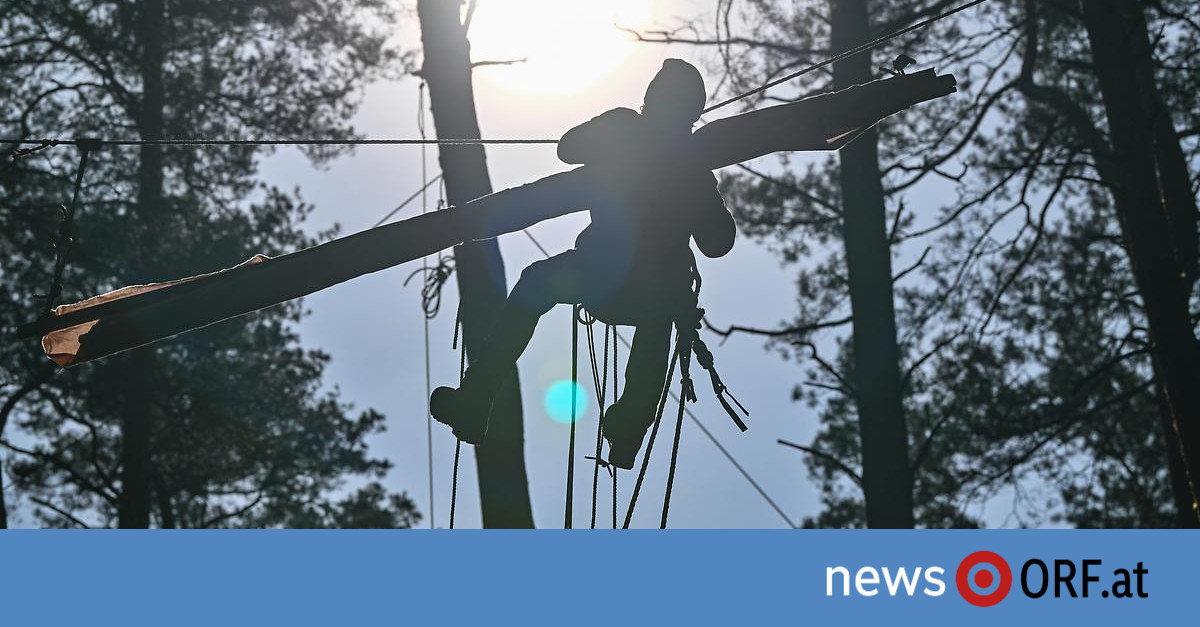The community of Grünheide in Brandenburg is in itself a place of pure idyllicness: the name says it all, with wide tracts of forest lined next to the lake district including a nature reserve. But since 2022, there is also a concrete desert of about 300 hectares in Gruenheide, about 30 kilometers from central Berlin: the European Tesla Gigafactory, one of the largest electric car factories in Germany and the first of its kind. Tesla's only factory in Europe.
Now Tesla wants to expand the site, which will require cutting down 100 hectares of forest. They want to build a shipping station, warehouses and a kindergarten for the company.
Protest in the tree house
There were already violent protests from environmental organizations against the construction starting in 2020, and residents never accepted their new large neighbour. Tesla's new expansion plans were recently rejected by a majority in a referendum. The local council is now expected to make a decision on the development plan in May.
Tesla is also criticized because, according to official measurements, certain values for wastewater in Grünheide were exceeded. Residents of Grünheide fear for their groundwater. So the Straussberg-Erkner Responsible Water Association met in a special meeting on Friday. The result: Tesla does not currently have to expect wastewater disposal to stop.
However, the assembly meeting did not reach an agreement and the draft decision to stop the disposal was postponed. Tesla previously warned the Water Association: “You know that stopping the discharge of wastewater into the Gigafactory will lead to the cessation of the Gigafactory’s production.” The company said in a letter that such a decision causes millions of dollars in damage every day.
So new protests against the expansion were expected – but this time activists brought not only a demonstration and banners, but also treehouses and supplies. A camp has been set up in the woods near the factory site since Thursday night, and there were between 80 and 100 activists there at the start of the weekend. They built tree houses several meters high, stretched ropes between pine trees and set up tents.
The police are letting things go for now
The police allowed the activists to do what they did and watched what happened. The police decided that the protest would continue until March 15. A spokesman said on Friday that because the meeting was not recorded, criminal proceedings had been initiated for violating the assembly law.
But camp participants want to protest as long as they believe it is necessary. A spokeswoman for the Stop Tesla initiative said: “The longer the occupation lasts, the better.” She invited other supporters to visit the camp and bring materials such as wood, saws, climbing equipment and hammocks. “We hope more people will come.” People are open to conversation, but “don't let yourself be chased out of the woods.” A few other protest events are planned in the woods throughout the weekend.
“What needs to happen for politicians to react and finally put human well-being ahead of profit interests,” Lou Winters of the Stop the Tap for Tesla coalition said Saturday. “Our protest has just begun and is only going to get bigger,” Winters declared. A protest rally against Tesla is scheduled for March 10. There should be more action in May. “E-mobility currently has a green veneer, but it is not a solution to the climate crisis,” Winters said. It called for the provision of expanded and free public transportation.
Silence at Tesla
Tesla did not comment on the protest camp next to the factory, just as the company's entire communications strategy surprised some. Berlin-Brandenburg (UVB) business associations have now publicly advised Tesla to adopt a more open information policy. “It is a rather unusual strategy of not speaking to anyone except the responsible authorities,” UVB Managing Director Alexander Scherb told RBB Inforadio on Friday.
“There's a lot of room for improvement because you can send messages that have the power to persuade,” Scherb said. It is not known that Tesla did not receive “one euro of financing” for the factory. 1,200 out of 12,000 employees – that is, a tenth – were hired due to unemployment.
Resistance is elsewhere too
Protests against Tesla have been going on for a long time and very consistently in Scandinavia: the strike of the IF Metall union has been increasingly widespread for almost four months. Initially, about 130 Tesla employees stopped working to force the company to enter into a collective agreement. Gradually, other industries and unions joined the strike, from dock workers who stopped loading cars to cleaning staff at Tesla offices.
Meanwhile, the Seiko Services and Communications Union expressed its solidarity with the Tesla strikers. This means that no new Tesla charging stations will be connected or planned. Trade unions in Denmark, Norway and Finland also support the industrial movement.
IF Metall recently announced that it will allow individual repairs on Tesla vehicles again. The planned exemption is intended to help Tesla owners “who are most affected by the conflict” – but not in pure Tesla workshops, but only in those dealing with brands from different manufacturers. So far, Tesla CEO Elon Musk, who is considered an opponent of unions, has not given up, and an agreement seems far-fetched. It is unclear whether he wants to accommodate activists in Gruenheide.

“Food practitioner. Bacon guru. Infuriatingly humble zombie enthusiast. Total student.”








More Stories
Kyiv: Russian Kursk offensive halted
US Presidential Election: Former US Government Officials Warn Against Donald Trump's Election
Netherlands wants to leave asylum system